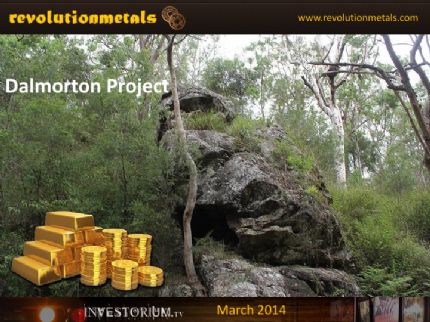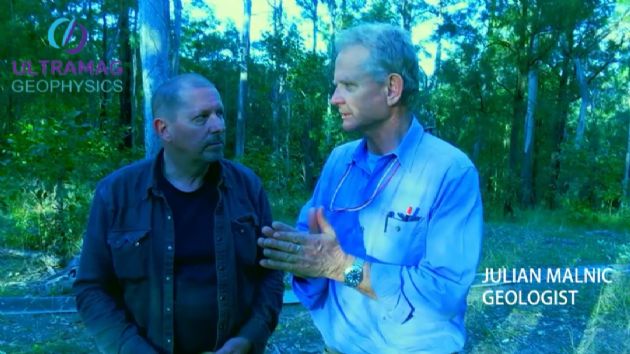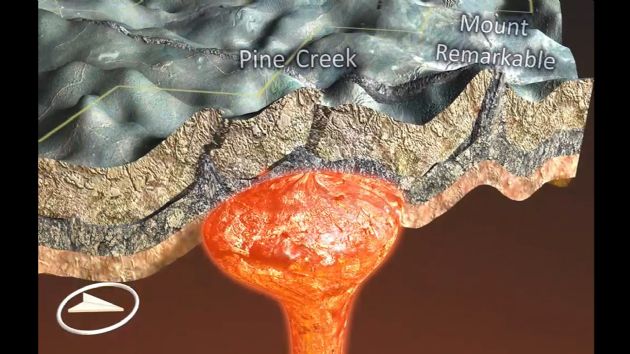Sydney, May 17, 2014 AEST (ABN Newswire) - Tim Mckinnon presents at Investorium.tv on behalf of Revolution Metals, April 28 2014 from Sydney Sky Tower to Sydney's Capital Market Participants.
Gold was originally discovered in the Dalmorton district during the 1860's and mining continued throughout a widespread area in alluvials and over one hundred reefs to shallow depth until 1942, when all mining activities ceased. The period of greatest reef-mining activity occurred between 1871 and 1900 when gold grades of up to 54 ounces to the ton were mined selectively from quartz reefs. Most of the known reefs have been located by a combination of field work and historical research.
Documentation of mining activities is poor as many of the official records were destroyed by fire at Dalmorton, however extensive research of historical records has provided information on mining operations associated with eighty five of the principal reefs, or groups of reefs. Most of the reefs contained varying quantities of sulphides (pyrite, arsenopyrite and galena) near to and below the water-table, usually causing difficulties in gold recovery at depth. Metallurgical treatment methods in common use today overcome these difficulties.
The known reefs generally strike over distances of 100 to 1000 metres and at least nineteen have widths in excess of one metre: the deepest shafts in the district were at the Garden Hill (43m), Golden Spur (41m) and Union (40m) reefs, however most reefs were worked to depths of less than 20 metres.
After 1942, when the Mount Remarkable mine closed, except for gold panning in creeks by prospectors, no activities were conducted in the district until 1981, when a programme involving regional inspection, churn drilling, orientation geochemical soil sampling and rock sampling was initiated by the Little River Gold Company. Concurrent with this work, extensive historical research of old records was conducted.
Significant exploration from 1981 to 1985 was carried out by the Little River Gold Company, which included Joint Venture arrangements with two large companies, BP and Getty Minerals. The search for a resource of over one million ounces of Gold in the area was abandoned prior to a full exploration of the area. An area known as the "Pine Creek Lode" was identified as being the most attractive resource containing 232,000 tonnes of ore at 3.27 g/t. The Pine Creek Lode differed from the surrounding hydrothermal quartz reefs in that it consisted of ironstone. Drilling was not completed on the deposit, as only some sections of the estimated 3,000 metre strike were evaluated.
The deposit was considered as sub-economic in the 1980's with the price of Gold less than $300 per ounce, and work discontinued. Subsequently, the area was declared a National Park and all mining activities were precluded, being part of the Guy Fawkes National Park. Recently, the Dalmorton area of the park was reclassified as a State Conservation Area (SCA) and was recognised to contain minerals of significance, allowing mining and exploration activities to resume.
An area of 36 square kilometres is currently under an Exploration License to resume the evaluation of the Pine Creek Lode.
To view the video presentation, please visit:
http://www.abnnewswire.net/press/en/77075/gold-in-nsw
About Revolution Metals Ltd

Revolution Metals Ltd is an Australian public company and developer of mineral resources. The focus of the company is to develop mineral assets of economic grade to production, providing investors with rapid return on investment. Revolution's current tenement holding comprises 40 square kilometres of mineralized gold, silver, nickel, cobalt and lead bearing structures in northern New South Wales, Australia.
The primary gold bearing ironstone and quartz deposits of Mt Remarkable, Pine Creek and Alice Cornwall, are part of a field of numerous reefs and historical artisanal workings with over sixty identified as producing gold over a century ago.
| ||
|











